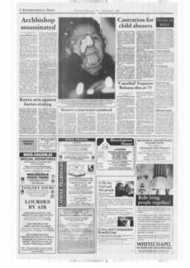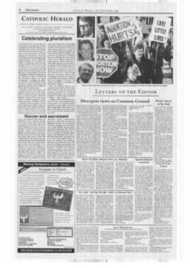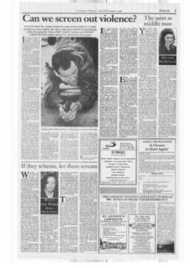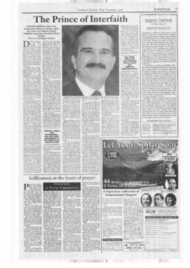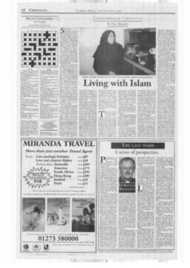Page 10, 8th November 1996
Page 10

Report an error
Noticed an error on this page?If you've noticed an error in this article please click here to report it.
Tags
Share
Related articles
The Convent Girls: Sr Mary Franciswood Crss
Manning's 'weary Penitent'
Molly Sent To Catholic School
Catholic Schoolgirl Says Her Battle For Peace Will Continue
Helping The Poorest Of The Poor
Living with Islam
BY PAUL MURPHY
SARA Goss's LIFE of quietness as a Catholic nun ended in 1982 when she was sent to Pakistan to train 12 girls who wanted to join a Catholic convent. Sr Sara, who had spent nearly 20 years in convents in a Welsh village and in Dublin, ended up as head of the convent of St Joseph in Quetta in Pakistan, only a few hours' drive from the Afghanistan border — close to where the Taliban forces have been operating.
Since they overran Kabul in September the Taliban imposed strict Islamic code, which, as we have seen in the press, included women having to be completely covered and prohibited from working outside the home.
Quetta is an odd mix of Afghans and nomadic tribals. Many of the women are not encouraged to go to school, and female literacy in this region of Baluchistan is among the world's lowest. Sr Sara's convent set up schools after the Second World War which have improved female literacy in Quetta. For Sr Sara, adapting to Islamic attitudes to women has been hard: she was once invited to dinner and never met the wife; and women are usually absent from the streets of Quetta as they are discouraged from going out alone. But she discovered that there was no simple, single way of summing up Islamic attitudes to women. Not least because the typical Christian woman in Pakistan does not see anything wrong with the Muslim way of life.
"I'm constantly bombarded with questions from Christian women in Pakistan asking me what has gone wrong with Western society. They think we are decadent, that Western women dress scantily, are quick to divorce, are having affairs, and don't love their children because they are not from an extended family. Catholics in Pakistan have no difficulty in merging with Muslim culture; they see their Islamic brethren keeping close to God. In the eyes of the West, women here live restricted lives; but they see themselves as free and tend to regard the West as decadent.
While I don't agree with
the harsh purdah system, I have come to admire the strictness of Islam as a counter-balance to Western permissiveness. Somewhere between the two lies the
golden mean." The standard message in reports on Islam in the Western media: extremist Islam is gnawing at liberal values. To be a woman in a Muslim society is to he a victim of oppression: symbolised by the Bangladeshi author, Taslima Nasrin, who fled into exile after receiving death threats from Muslim clergy for publishing her novel, Shame. The fact that Bangladesh (like Pakistan until last Monday) is headed by a woman prime minister does not apparently affect the general media view about the hapless condition of women. While this reflects one aspect of life in these Islamic societies, I found that the truth is much more complex and varied not a black-andwhite picture. During a recent
trip through Pakistan, Iran, and Turkey I talked at length to a number of women, both Muslims and Christians, who took exception to the negative way they were being portrayed in the West. The Christian women I met did not see themselves as subjugated victims; they also appeared to be living positive lives and achieving spiritual fulfilment.
THIS WAS NOT just confuted to indigenous people indoctrinated to a cultural way of life. I met Western women, like Sr Sara, who found virtues in the Islamic way of life. They might not have been happy about having to wear a veil, but the fact they were able to tolerate a completely alien way of life is worthy of note.
What they said concurred with the views of Jemima Goldsmith, daughter of billionaire Sir James Gold
smith, who last year married Iowan Khan embracing his Muslim faith. The women I met were concerned less with their condition, then with problems affecting women in the West. A typical question: 'Why are there so many reports of Western women suffering sexual attacks?'
Of the three countries I travelled in, Pakistan has the largest Christian community, numbering hundreds of thousands, many of whom are Catholics.
Iran has a small number of Roman Catholics, although there are tens of thousands of Protestants, Armenians and a tiny remnant of Christians whose group dates back to the missionary activities of the early Church.
Turkey has a very small Christian community, most of whom are Armenians: more than a million of them were massacred around the turn of this century. Yet modern Turkey is the most
liberal Muslim country, with over half the women wearing the veil, but a large number ignoring Islamic code and behaving just like Western women. In Pakistan and Iran, Christian women abide by the rules of Islam, which include wearing the veil. In both these countries the Christian community has political representation: this relative tolerance sets them apart from Muslim countries such as Saudi Arabia where public practice of the Christian faith is forbidden.
Every Tuesday at St Anthony Church, Lahore, a charismatic Mass is held which attracts over 2,000 devotees, a large proportion of whom are women bedecked in a rainbow of bright saris. One behind-thescenes worker who has helped to make these events a success is Josephine John, a science teacher at a Catholic school in Lahore, who also does voluntary service in promoting the
charismatic movement in Pakistan. "Christians in Pakistan appreciate living in a country with a strong belief in God," she said. "The average Christian lady in Pakistan is not concerned with women's rights," she asserted. "They appreciate the fact that women in general are treated courteously, and live in a country with a low divorce rate. Christians are proud of the strong family values which are a facet of life here," Sister Jacqueline, of the Dominican Sisters, Lahore, agreed with this view, adding: "There was nothing to stop women being successful, and many are leaving colleges and getting good jobs."
The mainline Protestant Church of Pakistan is equally traditional. Although affiliated to Canterbury (it was an Anglican Church before Pakistan became a nation in 1947), it has yet to approve the ordination of women priests. Mrs Stella Khan, a member of the Church of Pakistan in Lahore, said; "I'm against the idea of women clergy. Women have a more important position: to be good mothers."
In both Iran and Turkey, the women I met tended to be either liberals who rejected the Islamic treatment of women, or more traditional women who were not impressed by Western liberal values, Tarash, a philosophy student at Istanbul University whose family are Armenian Christians, said women students were not perturbed by the new Muslim fundamentalist government which came to power in Turkey in July. "Our main worry is jobs and the economy. It is true that the average girl in Turkey tends to be ruled by her parents, but that is better than the West where people live together before marriage. I don't know any women who support the permissiveness of the West." Thrash praised the fact that the new government has cracked down on pornography, banning erotic posters displayed outside a sleazy cinema that is directly opposite one of the largest Catholic Churches in Istanbul.There are many ways the Church and Islam can work together.
blog comments powered by Disqus



